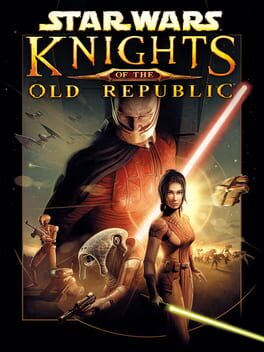Secretly the pinnacle of BioWare's method, KOTOR perhaps best exemplifies a fascinating tendency within the Western CRPG tradition, brought to full culmination in a much earlier title, the monumental Planescape: Torment. Like its older, stranger, and perhaps better brother, KOTOR is a game whose character creation starts the game with its familiar character sheet, continues onto the notorious twist, and ends with the epilogue. Every choice in dialogue (let's be real, where the real "gameplay" resides) from the moment your mysterious character awakens on the besieged spaceship is a step in this process. You chose what your face looks like, now you must choose what you are, think, and do, up until and and past the moment the mask you forgot is remembered again.
Every companion quest presents a similar engagement with identity, carrying on a particular pain from the past, learning to move on despite it: Vette from her brother, Bastila from her mother and the Order, and so on. This scheme, of the grand theme of the main story being reiterated in side quests in a smaller scale, is part of that peculiar WCRPG tradition, often found in virtually every story-driven WCRPG of this budget, period, and prominence. It is in that historical wave that KOTOR now loses itself. After all, it is not as innovative as the Baldur's Gates, as thorough as Planescape Torment. What's more, KOTOR moves away from the tabletop "authenticity" of its elders yet does so imperfectly, its brutally aged 3D models and gameplay barely hiding the invisible dice, dwarfed by the showy kineticism of, say, the Mass Effects. KOTOR is indecisive in terms of story and setting as well, moving away from the usual D&D fare but remaining part of an even bigger IP, with a central narrative that retreads the original trilogy from call to revelation to conclusion, with the subversive, Third Way, neither-Jedi-nor-Sith-but-love insights of the prequels sneaking about, mostly around the character of Jolee Bindo.
Yet I continue to think about this game, and continue to prefer this middle child to the Baldur's Gates and the Mass Effects. Perhaps it's some remnant affinity to Star Wars, but really it is the Star Wars mingling in the most interesting way with the video game medium, the choices interacting with the familiar arc of choosing family over any power, love over any loyalty, the future over any past. It is by no means the greatest game, but it is the greatest film-to-game adaptation I have ever played. In Return of the Jedi, Luke by hand removes Vader's helmet and finds sees the eyes of a child who has long outgrown the Jedi and the Sith but never not once even close his mother. In Knights of the Old Republic, those hands and eyes are yours.
Every companion quest presents a similar engagement with identity, carrying on a particular pain from the past, learning to move on despite it: Vette from her brother, Bastila from her mother and the Order, and so on. This scheme, of the grand theme of the main story being reiterated in side quests in a smaller scale, is part of that peculiar WCRPG tradition, often found in virtually every story-driven WCRPG of this budget, period, and prominence. It is in that historical wave that KOTOR now loses itself. After all, it is not as innovative as the Baldur's Gates, as thorough as Planescape Torment. What's more, KOTOR moves away from the tabletop "authenticity" of its elders yet does so imperfectly, its brutally aged 3D models and gameplay barely hiding the invisible dice, dwarfed by the showy kineticism of, say, the Mass Effects. KOTOR is indecisive in terms of story and setting as well, moving away from the usual D&D fare but remaining part of an even bigger IP, with a central narrative that retreads the original trilogy from call to revelation to conclusion, with the subversive, Third Way, neither-Jedi-nor-Sith-but-love insights of the prequels sneaking about, mostly around the character of Jolee Bindo.
Yet I continue to think about this game, and continue to prefer this middle child to the Baldur's Gates and the Mass Effects. Perhaps it's some remnant affinity to Star Wars, but really it is the Star Wars mingling in the most interesting way with the video game medium, the choices interacting with the familiar arc of choosing family over any power, love over any loyalty, the future over any past. It is by no means the greatest game, but it is the greatest film-to-game adaptation I have ever played. In Return of the Jedi, Luke by hand removes Vader's helmet and finds sees the eyes of a child who has long outgrown the Jedi and the Sith but never not once even close his mother. In Knights of the Old Republic, those hands and eyes are yours.
